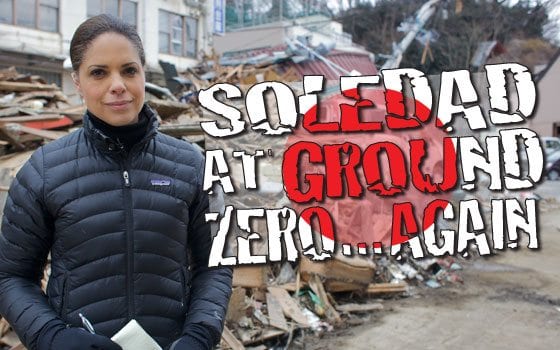Japan is the latest dateline in CNN’s Soledad O’Brien chronicle of natural disasters

Japan is the latest dateline in CNN’s Soledad O’Brien chronicle of natural disasters
CNN’s Soledad O’Brien has staked her career on reporting breaking news from domestic disasters like Hurricane Katrina as well as on location at international hotspots ranging from the sites of the Israeli-Hezbollah conflict to the terrorist attacks in London to the tsunami in Thailand.
She has also hosted a number of critically-acclaimed documentaries for the news network, including “Black in America,” “Latino in America,” “Eyewitness to Murder: The King Assassination,” “Pictures Don’t Lie” and the upcoming “Unwelcome: The Muslims Next Door.”
O’Brien is now, where else, but in Japan, where she is covering the aftermath of the earthquake, tsunami and nuclear meltdown. She was gracious enough to grant an interview from the midst of the disaster, checking in by cell phone to share her eyewitness perspective.
Do you worry about being exposed to nuclear radiation? I know that isn’t a sophisticated question, but there isn’t a person out there watching your coverage who is not wondering what I just asked.
No, I don’t worry. We’re careful. We don’t stand downwind. We haven’t been hanging out near the reactors in question, etcetera, etcetera. And there is a great deal of constant concern at very high levels about where every single person on our team is at any moment. So, we don’t go anywhere blindly without a lot of thought or without taking the proper precautions.
Right now, I’m up in the North, way out of the range. Safety’s always in the back of your mind whenever you’re reporting from a potentially-dangerous location, which is pretty much every story we’re covering here. But if I were really worried about it, I’d get on a plane and go home.
Are Japanese people allowed by their society to cry and mourn openly in the way that we are in Western culture? Are there mental health professionals available to treat post-traumatic stress and other mental health issues?
Absolutely! I’ve seen places set up for victims at evacuation centers where they’re dealing with the first wave of help which is usually food, water and a place to sleep. I wouldn’t be surprised at all if there are also going to be mental health facilities, because they’re set up similarly to many other organized disaster situations I’ve covered, where they make sure that people’s needs are being addressed, clearly including mental health issues.
The other question about culture and society is interesting because you do not see a lot of open weeping. I do believe that it’s a cultural thing here to be relatively quiet and to keep to yourself. In some other societies, you find people running up to the camera to share their stories, almost eager to feel like they’re speaking out to the world. I’ve already had some excellent opportunities to interview people since arriving, but Japan’s is a much more reserved culture, for sure.
What do you think that individuals can do to aid the Japanese people most effectively? In so many instances in recent years, the world immediately reacts by a humanitarian response to a natural disaster, yet the goods or funds collected do not reach the intended beneficiaries due to politics or mismanagement.
I’ve always been a big believer in finding a local charity that you like, read about or that people you know have recommended, and help them, whether it’s the American Red Cross or somebody else. Just give what you can. The amount doesn’t matter. It’s about making the gesture of reaching out to your fellow human beings to let them know that we’re here to support them. That’s what a donation is. It’s a way of saying, “We’re rooting for you and we care about you.” That message is what’s most important.
Is there a possibility that Americans are becoming “tragedy weary,” and that it will be hard for you as a reporter on the ground to rekindle our willingness to contribute and help out yet another nation in truly earth-shattering, dire straights?
No, I really don’t sense that. My job is to find important stories and to flesh them out in a way to make them relatable and bigger than the individuals I may be talking to. And if I do my job well, viewers won’t feel “tragedy weary.” You want to see tragedy weary? Come live here for a couple days. I’ll show you tragedy weary. The people I’ve been spending time with are completely tragedy weary. Why? Because when they wake up in the morning, they have to look for a place to go to the bathroom, then go fill buckets with water and scrounge for food to eat just to get through another day.
This disaster reminds me of New Orleans and Haiti. Will they be setting up tent cities as in Haiti? Or will they be shipping people to other parts of Japan for resettlement?
That’s a really good question. I’m sure there are plenty of people already relocated. But the scope of the damage varies. For instance, some towns are just gone. In that case, the inhabitants who survived have to move because the village doesn’t exist anymore. However, there are some cities where there are evacuation centers, so people won’t have to leave. They’ll be able to rebuild or have other options. But I do know that they’ve started shipping in family tents and structures for use as shelters in areas that were really hard-hit.
What did you learn about the Japanese or Japan that you didn’t know before?
That’s an excellent question. Something that I’ve seen frequently is survivors stopping rescuers from the Japanese Self-Defense Forces who are searching for bodies to say, “Thank you for doing good work,” or “Thank you for helping us.” It is a very polite society. Everybody thanks them for just being there.
Another thing I’ve witnessed is people who’ve lost everything and who are trying to hold themselves together come up to us and say, “We don’t know what to do next,” and ask us if we know anything. Sometimes, we in the media become a font of information, so people become willing to talk to us because they want some help.
Are the Japanese opening their homes to people in need?
Yes, I’ve been told about some folks who have taken in many homeless family and friends. But I haven’t seen it yet because the places I’ve visited are so devastated. Any homes still standing are uninhabitable because there’s no power or water. So, all the residents are going to shelters.
What is the culture like during a disaster? Is it people helping people? People helping themselves? People forming groups? Or people waiting for the government?
All of the above, depending on the disaster. Human beings are different. Some rise to the challenge and become the heroes, and others fall and become the looters and the criminals.
I’m sure that it takes a huge amount of courage to be in Japan right now. What emotions do you feel walking through the wreckage?
I think the emotions are always the same. It’s a real sense of sadness and palpable loss. The scope of it is always overwhelming to me. And I’m always awed by the power of a natural disaster, say, to deposit a large boat on top of a building. I’ve covered numerous tsunamis, yet I’m always stunned by something like that, no matter how many times I’ve seen it before. For me, my motivation is to tell the people’s story well, and to be part of a team that’s parachuting in to do just that.
Did you have any reservations about leaving your family for such an unstable danger zone?
You always have reservations. I have reservations about leaving my family in general whenever I get on a plane to go anywhere. That’s just the nature of the business. I think we take very calculated risks. Another tsunami could come through, and if you’re not prepared for it, you could be in trouble. So, we prepare as much as is feasible, given the possibility of things going awry. But yeah, sometimes I find myself really missing my family. That’s the way it works.
How does the devastation in Japan differ from other recent disasters?
What’s different here is that there’s a lot of debris scattered across rice paddies, which are big open spaces. You didn’t see that in Haiti or New Orleans. But I’ve also seen a lot of damage that reminded me of Katrina, like the pancaking of buildings. And of Haiti and Thailand where everything was literally just flattened out. Rubble … rubble … rubble … everywhere. Once a storm or a tsunami is powerful enough, it just shreds everything in its path. The damage looks very similar.
What message do you want the public to take away from your book “The Next Big Story: My Journey through the Land of Possibilities?”
In a way, I think we’re in the next big story, and I think that story is the story of the opportunity for some human beings to decide how they’re going to live their lives. Are you going to be a looter or a lifeline? Are you going to be the person who takes twenty people into your house? Or are you the person who breaks into stores? It’s really up to you. That’s what I’m here to witness and to tell stories about.




![Banner [Virtual] Art Gallery](https://baystatebanner.com/wp-content/uploads/2024/04/AmberTorres_4-667x848.jpg)

